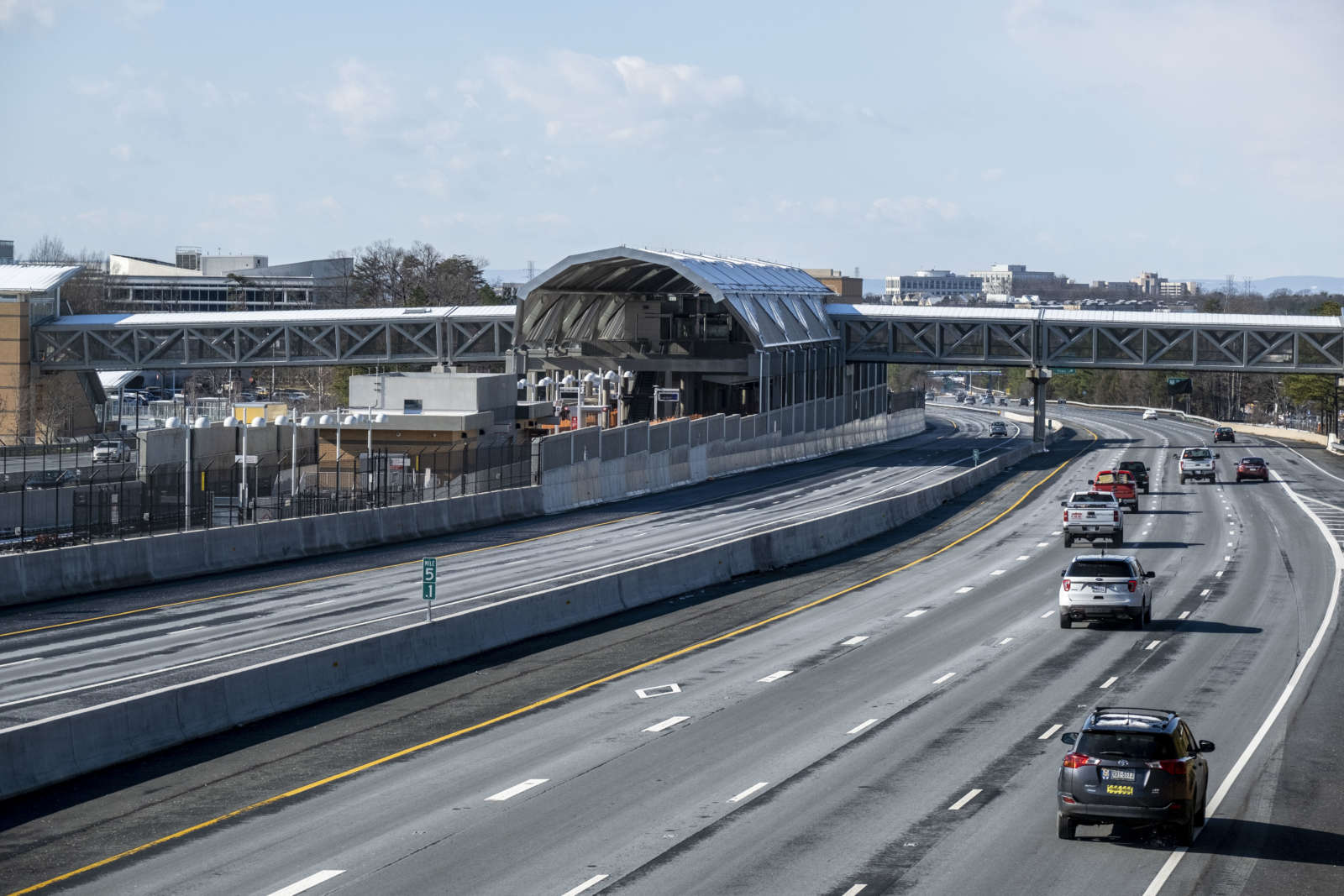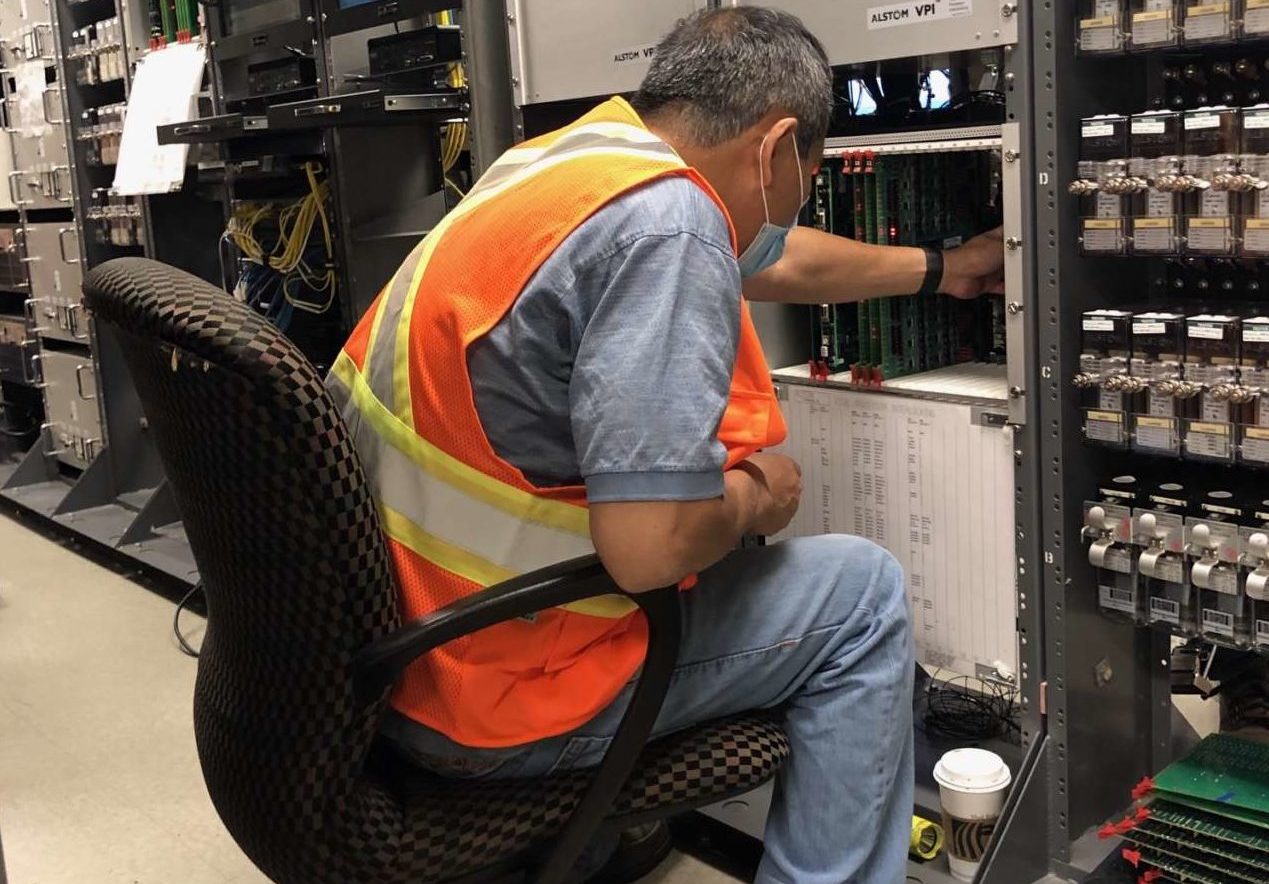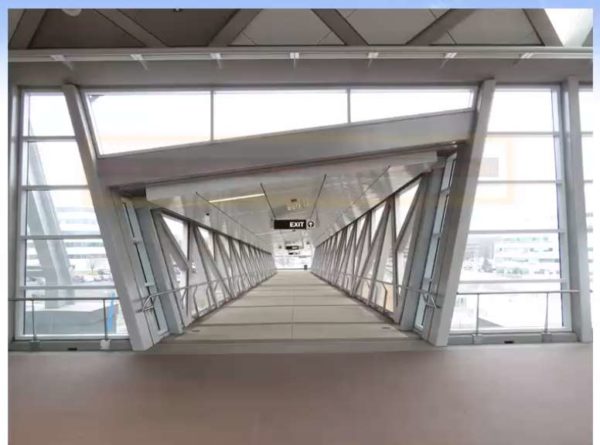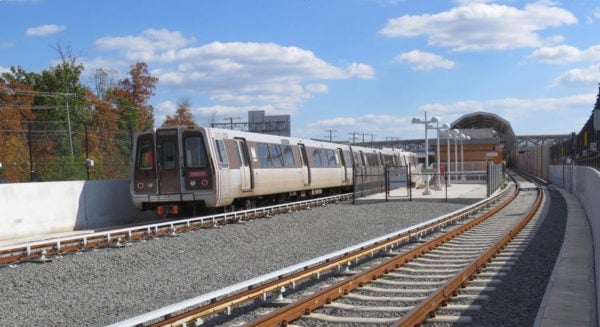The timeline for completion of the second phase of the Silver Line continues to be the subject of uncertainty.
Phase II of the Silver Line has the potential to open in the fall of 2021, at the earliest. That is subject to change, however, as there are multiple issues that must be resolved first.
Laura Mason, head of capital delivery for Metro, discussed 28 issues with Phase II of the Silver Line project during Metro’s Safety and Operations Committee meeting on Dec. 10. She detailed the status of 14 quality issues previously brought forth, as well as 14 unresolved issues.
Of the 28 total issues discussed during the meeting, 10 are unresolved, eight are underway where a tentative agreement exists and resolution is in progress, and 10 are resolved. Metro will require the resolution of the issues by the Metropolitan Washington Airports Authority (MWAA) and its contractors before accepting the project.
When MWAA reaches a substantial completion date (SSCD) after resolving issues to an acceptable level by Metro, Metro will conduct 150 days of operational readiness testing and pre-revenue activities before the potential start of service. MWAA currently projects a SSCD of April 1, 2021.
“Based on an April substantial completion, that would yield a tentative forecast of a start of service in the fall of 2021,” Mason said.
“However, we maintain that Metro will not set a date until all identified issues have been resolved to meet our acceptance and we have a clear path to an acceptance of the project.”
She clarified that MWAA’s response to the unresolved issues will determine the path forward and the timing of the ultimate acceptance or rejection of the project.
The 14 new issues presented at the meeting consist of four categories: component failures, stations and systems, yard buildings and other open issues with resolutions already underway.
“Individually, each of these issues is not on critical path. However, taken together, they represent concerns to the acceptability of the project,” Mason said.
The issues with the yard buildings involve safe occupancy and correcting problems to ensure Metro’s ability to use the facilities to maintain its fleet of rail vehicles once the line goes into service.
The component failures brought forth detail a collection of components that require replacement even before the system has opened for operations. Mason cited concerns “about the durability of the project” when discussing the component failures.
For example, the contractor has replaced more than 1,500 insulators that were exhibiting cracks as of April 2020. Several thousand damaged track fasteners have also required replacement.
Mason said the damage to the direct fixation track fasteners is one of the biggest areas of concern. The fasteners, which are used to hold the rail in place at the appropriate height and angle, typically have a lifespan of 20 to 30 years. She did label the issue as underway after conversations with MWAA and its contractor.
Two other primary concerns she listed are the installation of the station platform pavers and deficiencies of cross bond spacing.
The station platform paver installation was initially identified as an issue after Phase I and brought to MWAA’s attention in late 2017. Issues with the installation consisted of systemic joint failures at pavers, water penetrating setting bed, and significant efflorescence deposits at the platform edges.
The installation problem is considered a maintenance issue, not a structural issue, for the platform.
The cross bonds spacing issue exists in 20 locations that Metro identified as deviating from design criteria and industry practice. It is regarded as a high-risk item, but a resolution to address the issue is already underway.
“There are and will continue to be other issues that come up, and we will try first to resolve them at the project level,” Mason said.
“We’ve also implemented bi-weekly executive coordination meetings for technical review between myself, my counterpart at the Airports Authority and executives from the contractor teams.”
The project has faced a number of issues that have delayed its completion. More than 11% of the concrete panels at five of the six new stations on the extension were discovered to have cracks that needed to be repaired.
Issues with concrete and leveling were also found in September 2019, while defective concrete rail ties delayed progress in March 2019.
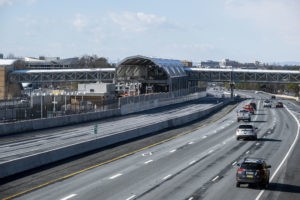
The announcement of more delays for the Silver Line have led to concerns from Supervisors Dalia Palchik and John Foust that Metro isn’t giving the communities around the Tysons area a fair shake.
Metro was one of several topics the supervisors spoke to the McLean Citizens Association about earlier this week.
“They are currently talking about reducing Metrorail service across the system to 80%,” Foust said. “Except that they’re saying they don’t have the funds to commence service on Phase II of the Silver Line.”
While Foust said the second phase of the Silver Line expansion isn’t quite ready for opening, it will be soon, and Foust said it deserved to be treated like any other wing of the Silver Line. Foust was particularly vexed by arguments from WMATA that Metro lines that had been operational before the shutdowns will be prioritized for service.
“If they get 80%, we should get 80%,” Foust said. “We’ve invested $6 billion into the Silver Line… I’m advocating for opening Phase 2 of the Silver Line as soon as possible.”
Palchik said these issues have been exacerbated by lack of communication between WMATA and Fairfax County.
“We found out, maybe hours before the public, that the Orange and Silver lines were being shut down,” Palchik said. “The lack of communication between our boards and the WMATA boards is frustrating beyond compare. [We] need to ensure we’re not seen as the wicked stepchild of the metro system.”
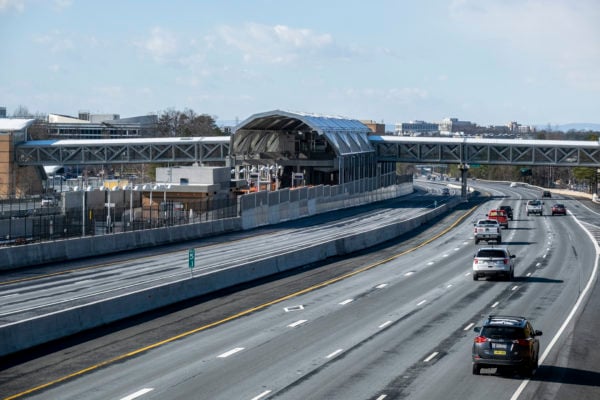
With COVID-19 induced budget cuts looming, Metro officials are considering pushing back the beginning of service for the Silver Line expansion to July 1, 2021.
The Metro Board of Directors will meet Wednesday to vote on a slate of proposed cuts, including postponing the beginning of service on the newest addition to the Silver Line, as Metro officials grapple with lost revenues from declining ridership during the pandemic.
While service for the second phase of the Silver Line, which would connect the Wiehle-Reston East Station through Dulles International Airport to Ashburn, was slated to begin in the Spring, financial troubles now mean the Silver Line’s expansion opening has been delayed again.
Due to declining ridership from the COVID-19 pandemic, Washington Metropolitan Area Transit Authority General Manager and CEO Paul Wiedefeld said he is projecting a $212 million budget shortfall, worse than what WMATA officials originally projected in their spring budget estimates.
Wiedefeld also said he anticipates WMATA will run out of federal funds from the CARES Act, which Congress passed in March to provide economic relief to localities during the COVID-19 pandemic, worsening budget woes. With more federal funding unlikely coming WMATA will need to make cuts, Wiedefeld said.
“What we have found since we developed our pandemic plan in, as you recall, in the spring that the recovery pace is much slower than we assumed when we approved the budget in the spring,” Wiedefeld said.
If approved, the delay in opening service for the expansion of the Silver Line is anticipated to save Metro $53.8 million in its operating budget for the current fiscal year, according to projections from WMATA.
The Silver Line expansion is the second phase of Metro’s plan to extend rail service from D.C. into Loudoun County, to give riders around the region quicker transit access to and from Dulles International Airport. The first phase of the Silver Line began service in 2014 with five new stations in Fairfax County.
Along with the delayed opening of the Silver Line expansion, Metro has also proposed saving money by restoring bus fares, which were suspended during the pandemic, increasing the number of turn-backs and cutting hours for rail service, ending service at 9 p.m Monday through Thursday.
“Some of these actions in one form or another may need to be taken into ensure we can finish the year on budget without the need for additional jurisdictional or federal funding,” said Joe Leader, Chief Operating Officer for WMATA.
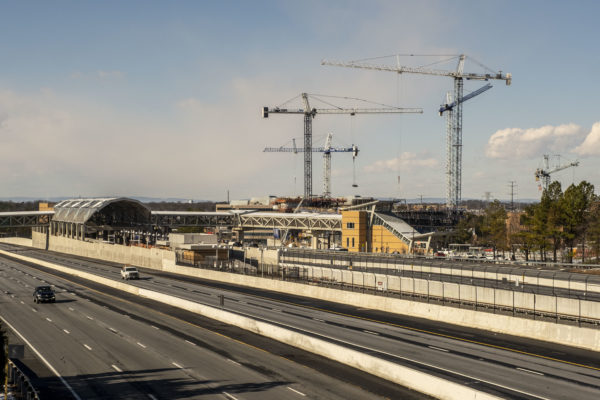
More than 11 percent of concrete panels at five of the six new stations on the Silver Line’s extension have cracks that need to b fixed, according to a new report by the Metro Office of Inspector General (OIG).
The report lays out nine conditional steps before the Washington Metropolitan Area Transit Authority can assume ownership of the project and let trains run.
Metro plans to open the extension in July 2021. The OIG audit was initiated at the beginning of the year after a whistleblower complaint in 2016 brought to light Universal Concrete Products’ failure to perform quality control checks. The concrete supplier gave Capital Rail Constructors, the company building the project, deficient concrete panels.
The report found that the Herndon Metro Station has the highest percentage of cracks — 14 percent — while the Reston Town Center Metro Station has a little over 10 percent of cracked concrete panels.
“These panels must be repaired prior to acceptance by WMATA,” states the Metro OIG in its report.
A sealant to repair the concrete panels could be applied every five to seven years in order to proceed with the project.
But the OIG report says that WMATA should not accept this solution “or any other measures short of complete replacement.”
The OIG laid out nine conditions the WMATA board should consider before taking on the project.
The Dulles Corridor Metrorail Project teams have completed the train control system connections for Phase 2 of the Silver Line Tie-In.
This connects the line to the rest of the region’s transit system and is a major step towards the completion of the rail line extension from the Wiehle-Reston East Station through Dulles Airport to Ashburn in eastern Loudoun County, according to a statement from the Dulles Corridor Metrorail Project.
Rail project crews were able to complete the tie-in work at the Wiehle-Reston East Metrorail while working with the Washington Metropolitan Area Transit Authority. The WMATA closed some Orange and Silver lines for maintenance work, according to the statement, allowing for crews to complete the Wiehle-Reston East work faster.
“Finishing the critical tie-in this summer means 13 previously planned WMATA shutdowns that had been planned over the coming months will not be needed,” said Charles Stark, the Airports Authority senior vice president and head of the Dulles Corridor Metrorail Project.
There will be three additional one-day shutdowns in November and December for systems and dynamic testing.
The project is aiming to turn over Phase 2 of the Silver Line to the WMATA around the first of the year, said the statement. Once construction and testing are complete, the Airports Authority will give authority to the WMATA.
The first phase of the Silver Line project from East Falls Church to Wiehle-Reston East with four stations in Tysons opened in 2014, according to the statement. Completion of Phase 2 from Wiehle Ave. to Ashburn will include stops at the Reston Town Center, Herndon, Innovation Center, Dulles Airport and Loudoun Gateway stations.
Photo courtesy of Dusty Smith
After a variety of issues and delays, Silver Line’s Phase Two is now aiming for completion in spring 2021.
Updates on the second phase of the Silver Line were briefly mentioned due to time constraints during the Transportation Committee yesterday. Phase Two will connect six new stations to the Wiehle-Reston East, bringing Metro riders out to Ashburn.
Hunter Mill District Supervisor Walter Alcorn said that he briefly talked to Paul Wiedefeld, the general manager and CEO of the Washington Metropolitan Area Transit Authority, last week.
“He assured me that — at least as of early last week — the Phase Two opening is still on track for next spring,” Alcorn said. “I’m sure there are probably a dozen ways that that can change, but for now, at least it is moving forward, according to that schedule.”
Phase Two is 98% complete overall, according to the presentation for Martha Elena Coello with the Fairfax County Department of Transportation.
The project has faced several delays, from train control software issues to flawed rail ties. The presentation addressed the ongoing issues the project has faced, including:
- concrete panel deficiencies
- concrete ties/cross level deficiencies
- fouled ballast
- automatic train control
- insulated joints replacement
Work is expected to finish on the new rail, systems, stations and yard later this year or early 2021.
Recently, “substantial work” wrapped up on the garage at the Innovation Center Metro station, according to the presentation. The garage, which costs roughly $52 million, is 98% complete and awaiting its official occupancy permit, according to the presentation.
Bus loop work is expected to be done at the Herndon station garage this month.
The presentation also provided an update on the bus service plan for Phase Two. Currently, Fairfax County is seeking public input on the plan.
More from Fairfax Connector:
Welcome to the Reston-Herndon Area Bus Service Review final round of public input!… Fairfax Connector is considering a variety of options to improve bus service to, from, and around the new stations in Fairfax County.
Our previous round of outreach proposed three bus transit service alternatives, each with their own set of unique characteristics. We ranked the alternatives based on coverage, average travel times between key origin-destination pairs, and ridership potential (see right). We also listened to what Connector riders and nonriders had to say through several public meetings and an online survey. Based on feedback received, the preferred alternative presented today is cost-neutral, and includes the best elements of the three originally proposed scenarios and existing service.
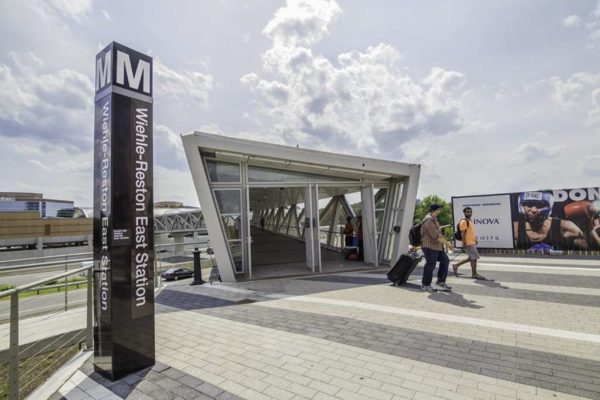
Construction of the Silver Line extension into Loudoun County has cleared a major hurdle.
Crews with the Metropolitan Washington Airports Authority have begun the process of tying in the current Silver Line with the extension.
On Friday, crews began the tie-in process at the Wiehle-Reston East Metro Station, which would connect phase two’s computerized control systems to the rest of the Metrorail system.
Capital Rail Constructors, its subcontractors, the MWAA, and the Washington Metropolitan Area Transit Authority are cooperating to complete the effort.
“The tie-in project is critical and complicated work that requires close cooperation and coordination among contractors and WMATA,” said Charles Stark, MWAA senior vice president and head of the Dulles Corridor Metrorail Project.
The extension is expected to be fully operational in the spring. Currently, all five Silver Lien stations are closed during the summer shutdown.
Tie-in work will be completed by the end of July. After construction is completed, WMATA will assume ownership of phase two and conduct additional testing. A final date for completion of the overall project will be set at a later point.
“Months of preparation and coordination between Capital Rail Constructors, WMATA and the Airports Authority led to the initiation of the tie-in work, to ensure that software and other controls on both sections,” according to a statement from the Dulles Corridor Metro rail Project.
Once complete, the extension project will run along 11.5 miles of track from Wiehle Avenue to Ashburn.
When the Silver Line suspends rail service west of Ballston this summer, drivers can use free parking at the Wiehle-Reston East Metro station.
Fairfax County announced yesterday that the station will have free parking while work is underway to connect the Silver Line Phase II stations, which will run from Reston to Ashburn.
Metro wasn’t originally planning to add the upcoming Silver Line stations, but due to lower ridership, Metro decided to add the Silver Line work to its summer closure of the Orange Line in parts of Northern Virginia.
“The closures begin Memorial Day weekend 2020 and are expected to continue through the fall,” according to the county.
Photo by Chuck Samuelson/Dulles Corridor Metrorail Project
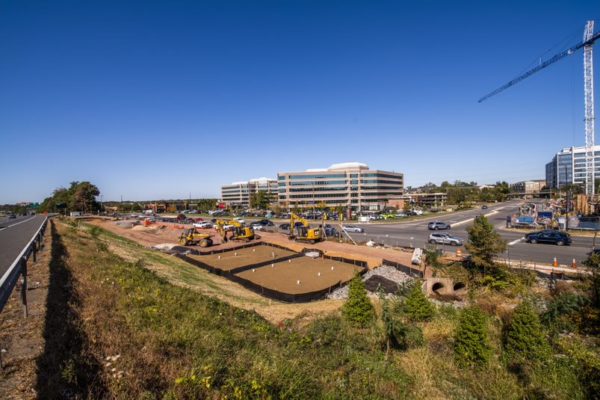
The construction of a series of stormwater ponds to collect and treat runoff from phase two of the Silver Line is underway.
A spokesperson for the Dulles Corridor Metrorail Project says that four of the 15 stormwater management facilities along the extension project have been completed.
The largest facility is wetlands constructed near the county’s garage south of Herndon Station.
The extension project implements new stormwater management standards to treat runoff and remove pollutions, according to Stephen Barna, the project’s engineering director.
“The project elected to adopt the new standards for the benefit of the public,” he said.
Here’s more from the Dulles Corridor Metrorail Project on the projects:
They have varying features from dry swales with specialized filters to manmade wetlands that contain multiple bioretention pools to treat stormwater flow.
While the stormwater management facilities in Phase 1 were designed primarily to prevent flooding, the ones that were built in Phase 2 were designed to also remove pollutants while retaining runoff.
Special grasses and plants are planted within the Phase 2 ponds, while locally appropriate trees.
Photo via Dulles Corridor Metrorail Project
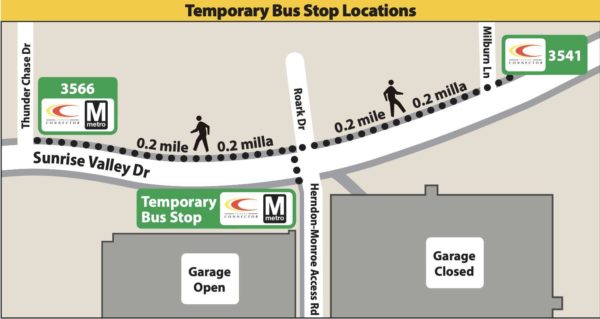
Construction at the Herndon-Monroe Park and Ride bus loop will resume next month.
The project is part of ongoing efforts to prepare for the conversation of the location to the Herndon Metrorail Station as part of the Silver Line extension part. Improvements to the bus loop are planned.
Fairfax Connector bus service will be relocated to temporary stops on Sunrise Valley Drive beginning May 4.
The project is to finish sometime in June, according to county officials. The current garage will remain open and the garage that is currently under construction is expected to reopen in September.
The following routes will be affected by ongoing construction:
More information about the project is available online.

Although Metro is currently cutting routes and closing stations due to COVID-19, planning continues for the extension of the Silver Line into Loudoun County.
Initially, officials estimated phase two of the project would open by the summer. After delaying the projected opening several times and by several months, Metro officials now say the first trains will not begin running until April 2021, according to budget documents.
The 11-mile extension, which includes six new stations, will provide service to Dulles International Airport and Loudoun County.
A vote on Metro’s $2.1 million operating budget for the overall system is set for Thursday. But changes could be enacted by June as the coronavirus outbreak unfolds in the region.
The proposal includes an increase in rush-hour rail fares, the restoration of some late-night service, and cuts to the number of bus routes.
Trains would run every 12 minutes instead of every eight minutes on all lines on weekdays between 5 a.m. and 6 a.m.
Photo by Jay Westcott
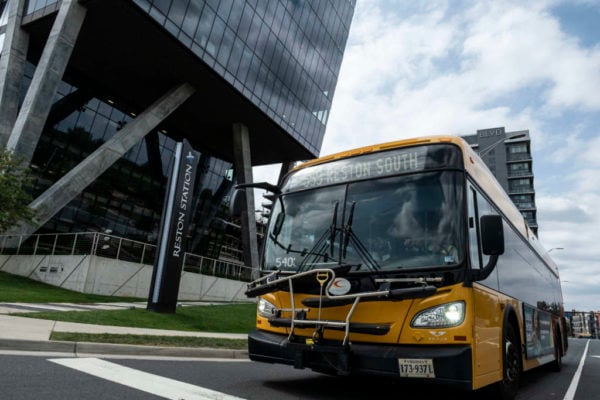
The Fairfax County Department of Transportation is seeking input on future bus service to and from phase two of the Silver Line.
Residents can provide feedback at two meetings: Hutchinson Elementary School on Sat., March 21 from 10 a.m. to noon and South Lakes High School on Wed., March 25 from 7-9 p.m. Feedback will also be accepted online from March 16 through April 16.
Service will begin once the Metro stations are Reston Town Center, Herndon, Innovation Center, Dulles Airport, Loudoun Gateway and Ashburn are open.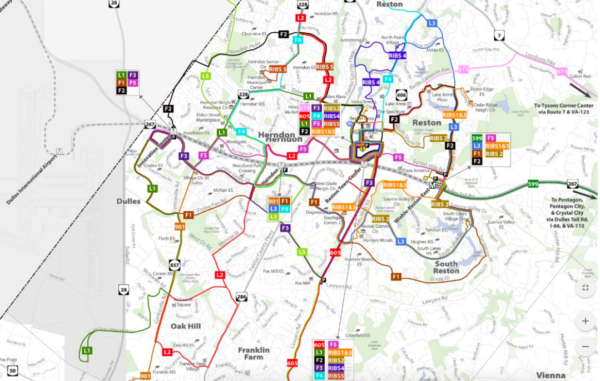
In December, FCDOT officials backed the most transformative of three options to change service levels. This approach would impact a greater coverage area and was endorsed by the county’s Multimodal Advisory Committee. Other options include incremental changes to service plans or streamlining of existing routes.
More information about the proposals is available online.
Staff photo by Jay Westcott

A long-awaited report by Metro’s Office of Inspector General flags new major concerns with the extension of the Silver Line into Loudoun County. It’s unclear if new issues will cause further delays for the long-awaited project, which is expected to open next year.
The 23-page report flags longstanding concerns and new issues that have arisen. The report cautions Metro from accepting the project from the Metropolitan Washington Airports Authority — which is in charge of construction — until problems have been resolved.
Specifically, the report finds that WMATA has had trouble ensuring that the Automatic Train Control (ATC) system is integrated between the first and second phases of the project.
“The unresolved issues with ATC system acceptance requirements create the potential for even more schedule delay beyond what is already reported. Additionally, these deficiencies do not engender confidence in system safety,” the report states.
Issues that have been long under discussion — such as issues with surge arresters, switches, and misplaced rail joints — are also discussed in the report.
Overall, the report finds two major issues: ineffectiveness and inconsistencies in the contractor’s efforts to ensure problem areas are addressed and the absence of an integrated approach to view the extension’s infrastructure from a holistic and outsider perspective.
The report does not delve into issues of cracks in concrete panels just yet. The Office of the Inspector General is working with an independent contractor to inspect each panel to determine its condition, according to the report. So far, the MWAA’s contractor has found cracks in 24 panels.
It’s possible the latest report could delay Metro’s opening even further. Officials expect it to open in the spring.
Staff photo by Jay Scott
The garage at Innovation Center Metro Station is nearly complete.
The $52 million project is almost entirely built-out. Crews must now install elevators, finish installing utilities and complete the final concrete work outside the garage.
Metro officials said the project required $5 million less than what was originally allocated.
Construction on the 11-mile extension of the Silver Line is also nearly complete, but concerns about deficiencies in the concrete panels and concrete ties have stalled the project.
Currently, site inspections and safety testing are ongoing. Previously approved shutdowns for the Wiehle-Reston East Station on weekends were canceled due to pending system integration work.
Metro does not plan to accept the rail project the Metropolitan Washington Airports Authority until both the rail yard and mainline tracks are complete. The start of service is expected to begin by October this year.
Photos via handout/Fairfax County Government
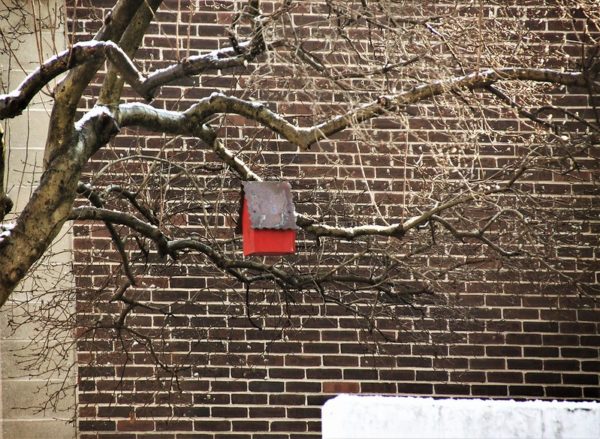
Metro Releases Operating Budget for Silver Line Extension — “Metro will need $24 million from the District, Maryland and Virginia to begin hiring employees and preparing for service on the Silver Line extension, according to an operating budget proposal for the project released Monday. The transit authority plans to devote $60 million — including the local contribution — in this fiscal year to staff the long-awaited nearly-11-mile rail extension, which will connect Dulles International Airport to Loudoun County.” [The Washington Post]
Washingtonian Features Reston Company — “Today Parabon has become the hottest thing in cold cases, with law-enforcement agencies lining up for help in solving old crimes. Using an innovative method that can analyze DNA from incredibly small samples, Parabon’s Snapshot creates a genetic-genealogy report that’s used to find possible familial links via public DNA databases. Parabon contributed to breaks in several hundred crimes over the last year alone.” [Washingtonian]
Photo via vantagehill/Flickr


